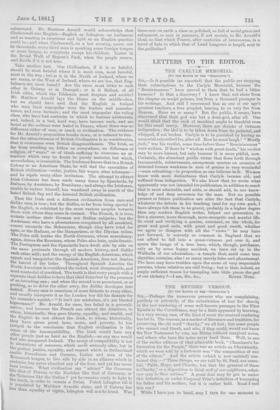LETTERS TO THE EDITOR.
THE CARLYLE MEMORIAL.
[TO THE EDITOR OF THE ..13PECTATOR.1 SI11,—Is it possible (as reported) that the public are stopping their subscriptions to the Carlyle Memorial, because the " Reminiscences" have proved to them that he had a bitter humour ? Is that a discovery P I knew that, not alone from the chapter on model prisons, but from a thousand passages in his writings. And still I reverenced him as one of our age's greatest teachers, a true prophet, bearing to us very fire from Heaven. Have we so many P But the public, it seems, have discovered that their god was but a demi-god, after all. One would think that the ruck of mankind might be thankful even for this small mercy. However, there are shrieks of virtuous indignation ; the idol is to be taken down from its pedestal, and whipped, if not broken. Carlyle is to be punished by having no memorial subscribed for, after all. How he must laugh ! " Mostly fools," was his verdict, some time before these " Reminiscences " were written. If there be " wisdom with great death," his verdict may be more lenient, but only because it is more pitiful, now. Certainly, the abundant public virtue that flows forth through innumerable, subterranean, anonymous sources on occasion of detected human weakness in men of genius is very wonderful —even refreshing—in proportion as one believes in it. We now know with more distinctness that Carlyle became old, and suffered from indigestion. We also know that he wrote what apparently was not intended for publication, in addition to much that is most admirable, and adds, or should add, to our know- ledge of and deep reverence for the man. But no possible present or future publication can alter the fact that Carlyle, whatever the defects in his teaching (and for my own part, I have always felt them to be grave), probably in a higher degree than any modern English writer, helped our generation to live a sincerer, more thorough, more energetic and manful life. So vivid and vivifying a genius, exercised, on the whole, for great and good ends, with great and good result, whether we agree or disagree with all the " views " he may have put forward, is scarcely so common in England that we can afford to fall into a quasi-virtuous pet over it, and spurn the image of a true hero, which, though, perchance, only as by some happy accident, we have set up in the Walhalla of our admiration,—a temple that, amid some true dignities, contains, alas ! so many merely false and phantasmal. The hero may have trodden upon the corns of very respectable persons, whose relatives are still living ; but is that, indeed, an amply sufficient reason for trampling into little pieces the god


































 Previous page
Previous page